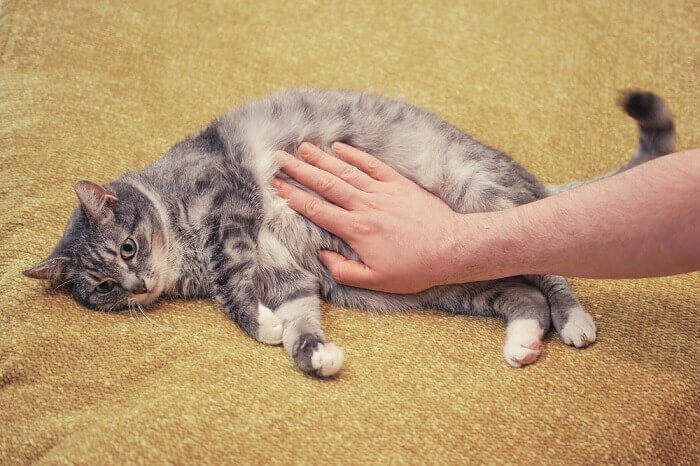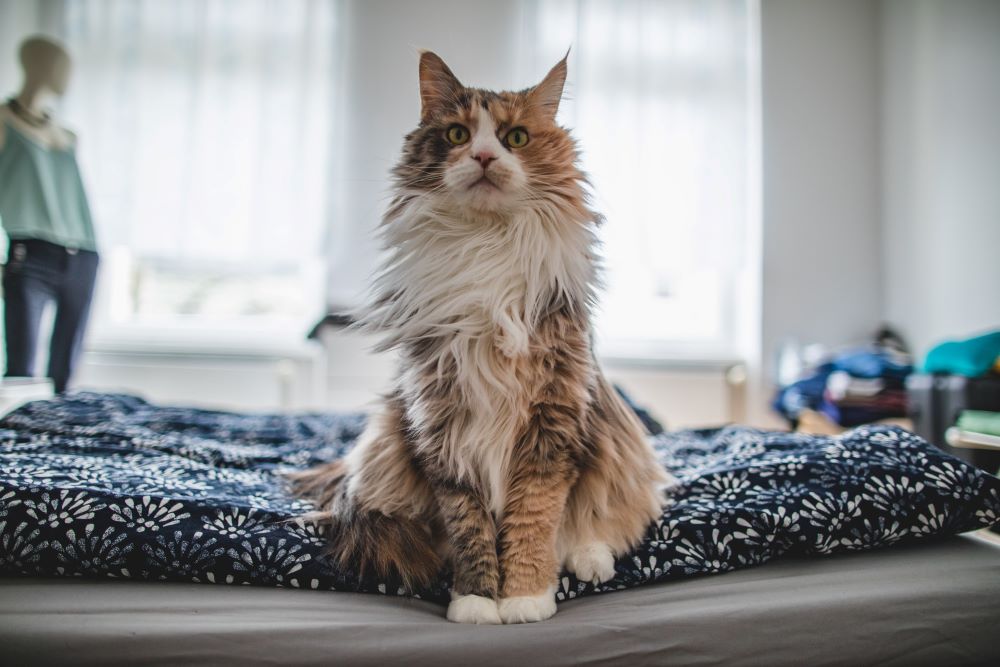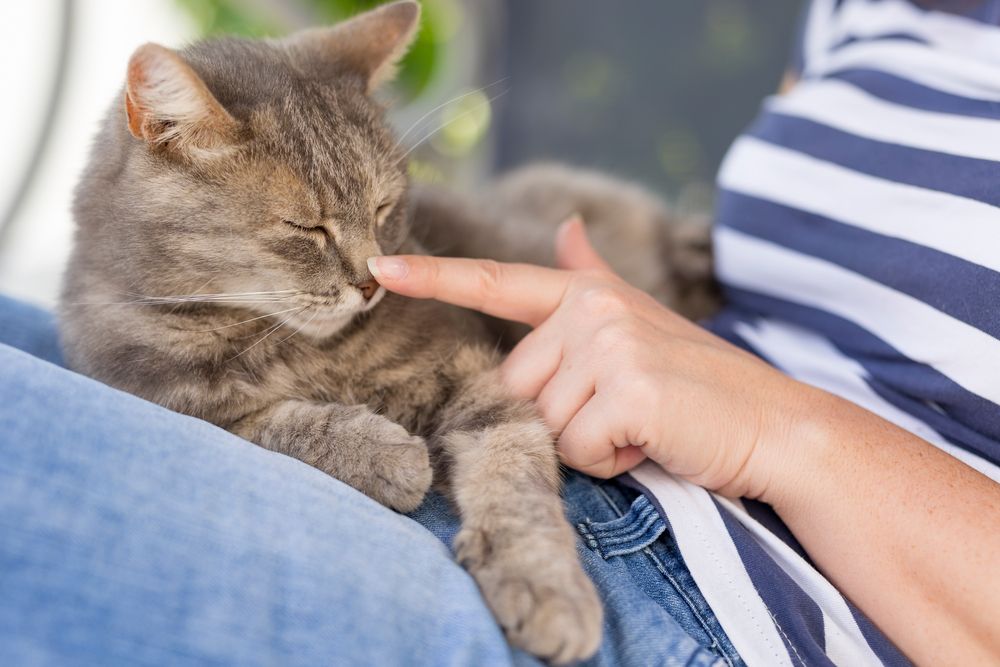
Although stomach cancer is a relatively uncommon condition in cats, it can and does occur. Unfortunately, it is often associated with a relatively poor prognosis. Read on to learn more about this condition.
Quick Overview: Stomach Cancer In Cats
 Common Symptoms: Vomiting, diarrhea, weight loss, blood in vomit or stool, gas.
Common Symptoms: Vomiting, diarrhea, weight loss, blood in vomit or stool, gas.
 Diagnosis: X-rays, ultrasound, gastroscopy (endoscopy of stomach), MRI or CT scans, bloodwork, urinalysis. Fine needle aspirate or tissue biopsy of a mass visible on ultrasound or endoscopy.
Diagnosis: X-rays, ultrasound, gastroscopy (endoscopy of stomach), MRI or CT scans, bloodwork, urinalysis. Fine needle aspirate or tissue biopsy of a mass visible on ultrasound or endoscopy.
 Requires Ongoing Medication: No
Requires Ongoing Medication: No
 Vaccine Available: No
Vaccine Available: No
 Treatment Options: Surgical removal of a tumor is treatment of choice. Other therapies like radiation therapy, chemotherapy, and immunotherapy, may be discussed as appropriate.
Treatment Options: Surgical removal of a tumor is treatment of choice. Other therapies like radiation therapy, chemotherapy, and immunotherapy, may be discussed as appropriate.
 Home Remedies: None
Home Remedies: None
What Is Stomach Cancer in Cats?
Cancer refers to the uncontrolled division of abnormal cells in the body. Stomach cancer, then, refers to a cancerous mass that grows within the stomach. Stomach cancer in cats may occur as an isolated mass, or may be a component of more widespread disease that affects the entire digestive tract.
There are several different types of cancer that can affect the stomach. Each type of stomach cancer has a different prognosis and will best respond to different types of treatment. Therefore, accurately diagnosing the type of stomach cancer is essential for treatment.
Causes of Stomach Cancer
The most common type of stomach cancer in cats is lymphoma.
Gastric lymphoma, or lymphoma of the stomach, can occur as a single, isolated mass within the stomach wall or it may be a component of more widespread lymphoma affecting the entire gastrointestinal tract.
In most cases, the cause of a cat’s lymphoma is unknown. Two feline viral infections, Feline Leukemia Virus (FeLV) and Feline Immunodeficiency Virus (FIV), have been shown to increase the likelihood of an infected cat developing lymphoma.
Other factors associated with feline lymphoma include living in a home with smokers and inflammatory bowel disease (which is caused by food allergies or other factors). However, it is impossible to determine why one cat develops lymphoma and another cat does not.
A number of other cancers can develop in the stomach of cats.
These cancers include adenocarcinoma, adenoma, cell tumor, carcinoid tumor, extramedullary plasmacytoma, gastrointestinal stromal tumor (GIST), leiomyosarcoma, mast cell tumor, and other sarcomas. The underlying cause of these stomach cancers is unknown.
While stomach cancer in humans is often attributed to Helicobacter pylori, a bacterium associated with ulcers, there does not seem to be a connection between Helicobacter infection and stomach cancer in cats.
Similarly, diet does not seem to play a role in feline stomach cancer in the way that diet can predispose some humans to stomach cancer.
Symptoms of Stomach Cancer in Cats

The symptoms of stomach cancer in cats include vomiting, diarrhea, weakness, and loss of appetite.
The symptoms associated with stomach cancer in cats may vary, based on the severity of disease and the precise location of the stomach tumor.
Signs that may be observed with stomach cancer include:
- Vomiting
- Diarrhea
- Blood in the vomit or stool
- Weight loss
- Lethargy (decreased energy levels)
- Loss of appetite or anorexia
If your cat is losing blood from a stomach tumor, you might also notice signs of anemia. Your cat may develop pale gums, in addition to a dramatic decrease in energy levels.
Diagnosis of Stomach Cancer in Cats
When a cat develops gastrointestinal signs, your veterinarian will first perform a comprehensive physical exam.
Your cat’s overall health will be assessed, including body weight, hydration, mucous membrane (gum) color, and your cat’s mental attitude (alert, lethargic, non-responsive, etc.). Next, your veterinarian will focus on your cat’s abdomen.
By palpating or feeling your cat’s abdomen, your veterinarian will search for a palpable stomach or intestinal mass, enlargement of other abdominal organs, or fluid within the abdomen.
If an obvious cause for your cat’s gastrointestinal signs is not found on physical exam, your veterinarian will recommend a further workup.
A complete blood panel, including a complete blood cell count (CBC) and serum biochemistry panel, will often be performed first.
In a cat with stomach cancer, this bloodwork may show signs of anemia (due to blood loss), increased white blood cells (associated with inflammation), and decreased blood protein (due to protein loss from the mass). If your cat’s liver is also affected, your veterinarian may also notice increases in one or more of your cat’s liver values.
Next, your veterinarian will recommend imaging.
Radiographs (x-rays) and ultrasound can both be used to provide a view of what is going on in your cat’s abdomen. Radiographs are less expensive than ultrasound, but they also show less abdominal detail than an ultrasound.
Ultrasound is more informative, providing a three-dimensional view of all structures in the abdomen, including the lymph nodes, and provides the ability to detect small metastases. However, ultrasound often requires referral to a veterinary specialist, as well as sedation.
Your veterinarian will discuss the pros and cons of each approach, to determine whether you want to begin with radiographs or go straight to ultrasound in your cat’s diagnostic workup.
In order to definitively diagnose stomach cancer, a cellular diagnosis is needed.
In some cases, a fine-needle aspirate of the mass can be performed during an ultrasound. In this test, the veterinarian passes a needle into the mass, using ultrasound guidance, with the goal of collecting cells for microscopic examination.
If your cat’s mass cannot be diagnosed with a fine needle aspirate (due to its location or because the cells do not exfoliate readily into the needle), your veterinarian will need to perform a biopsy.
Depending on the location and characteristics of the mass, a biopsy sample may be obtained by endoscopy (passing an endoscope and medical instruments into your cat’s stomach via the mouth, while your cat is under anesthesia) or surgery. Your veterinarian will talk to you about possible diagnostic tests and help you weigh the pros and cons of each approach.
Stomach Cancer in Cats Treatment

The appropriate treatment will depend on your cat’s unique situation.
The treatment options for stomach cancer depend on the type of cancer, the tumor size, and the tumor location. If a cat has a single, isolated stomach mass, surgical removal is the best option. Radiation therapy may also be used, either alone or in addition to surgery.
Most feline stomach tumors are caused by lymphoma, which is treated with chemotherapy. Treating lymphoma involves a combination of oral and injectable chemotherapy medications. Fortunately, cats do not typically suffer the same side effects of chemotherapy that are seen in humans and chemotherapy is often well-tolerated.
If chemotherapy is not an option for a particular cat, due to the cat’s condition or owner financial constraints, prednisolone (a steroid) may be prescribed for palliative or hospice care. Prednisolone will not cure the lymphoma, but may help improve the cat’s quality of life for a brief period of time.
Conclusion
Effective treatment of stomach cancer requires a prompt diagnosis. If your cat has signs that may be consistent with stomach cancer, contact your veterinarian to schedule a physical examination. Based on your cat’s exam findings, your veterinarian will recommend the most appropriate workup for your cat’s condition.
Frequently Asked Questions
How long can cats live with stomach cancer?
The prognosis for a cat with stomach cancer depends on the type of cancer and how advanced the cancer is at the time of diagnosis. A cat with gastric lymphoma can be expected to survive an average of six months with chemotherapy, although a cat that initially responds favorably to chemotherapy can be expected to survive for over a year, on average.
What are the symptoms of stomach cancer in cats?
The signs of stomach cancer can vary, but often include a combination of vomiting, diarrhea, weight loss, decreased appetite, and lethargy. In some cases, vomit may be observed in the blood or stool.
My cat has cancer. When do I put him down?
Deciding when to euthanize a pet is often a challenge. Your goal is to euthanize your cat before he or she begins to suffer, but you also don’t want to euthanize too early. If your cat has been diagnosed with stomach cancer, talk to your veterinarian about how you can monitor your cat’s quality of life and determine appropriate timing for euthanasia.








Thank you for this wonderful service